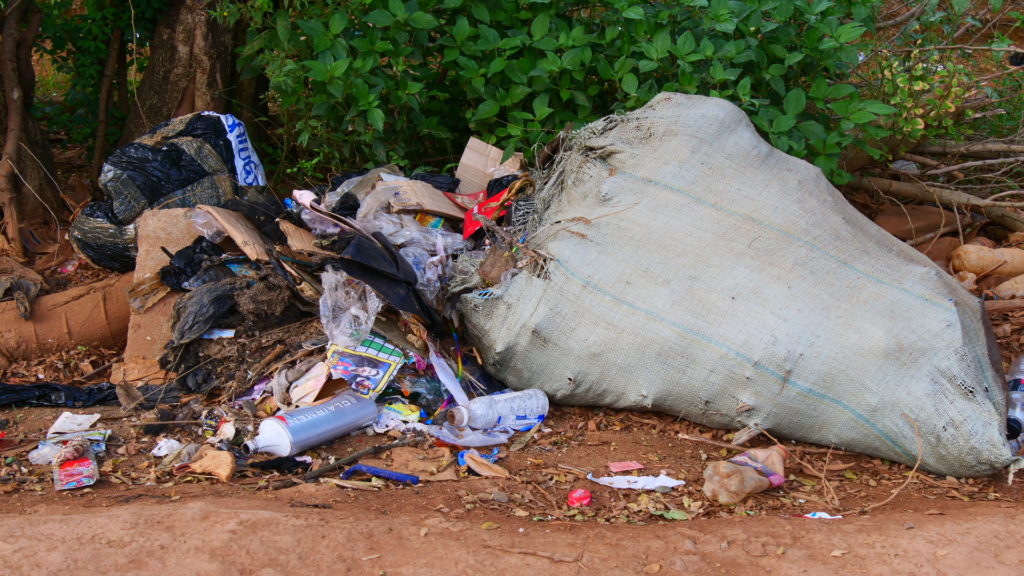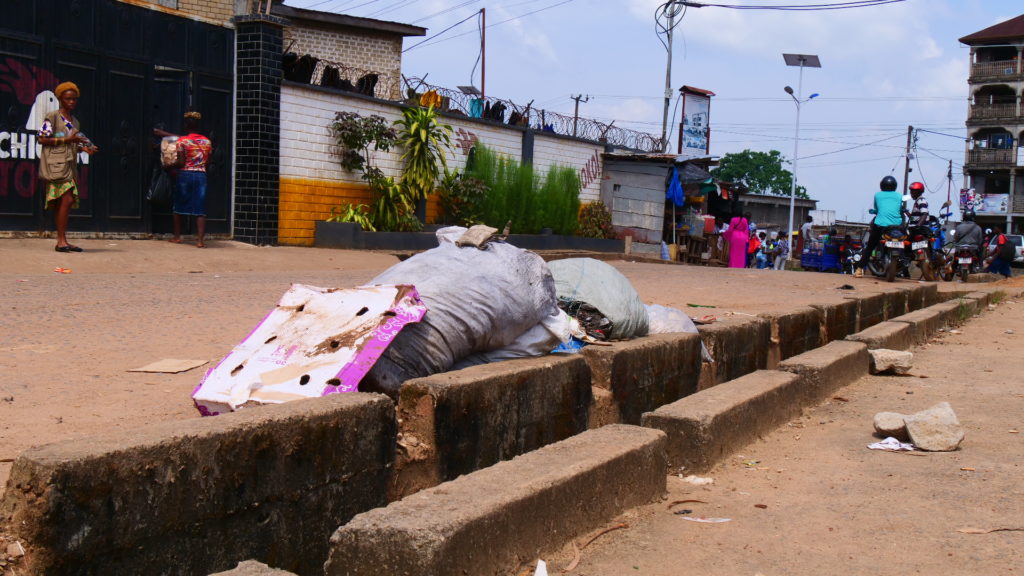By Kemo Cham and Watta Koroma
In Kossoh Town, a suburb of Jui which lies just outside the far east of Freetown, there is hardly any street these days that is free from waste indiscriminately dumped by the roadside.
This phenomenon represents a long time waste management challenge for urban communities in Sierra Leone.
But here in Kossoh Town and the larger Jui communities, the issue is fast becoming a crisis.
“Presently, we do not have a place to dump waste. Our constraint is that the boys who collect trash from us, dump them in another man’s back yard,” laments Kossoh Town Resident, Isatu Kamara.
Kossoh Town is popularly known for being home to the country’s only public medical school – the College of Medicine and Allied Health Sciences (CMAHS) – which lies next to the Sierra Leone-China Friendship Hospital, better known as Jui Hospital.
The town is also home to many businesses.
Like in every urban center across Sierra Leone, population increase hasn’t been matched by adequate provision of social services in the Western Area Rural District.
Osman Conteh, Zonal Chairman of Kossoh Town Community, recently organized a cleaning exercise along Sorie Lane, where the medical college and the hospital are situated. One challenge he had was where to dump the waste generated.
“We thought it fit to clean our community, because it’s not good when the community is filthy, otherwise we attract flies and the place smells,” saidMrConteh.
Sorie Lane is a busy business center, thanks to the Jui Hospital and the medical school. The street is lined with several entertainment centers, including restaurants. It becomes even more livelier at night.
Few weeks after the street was cleaned by community volunteers, residents woke up to a scene of abandoned wastes all over the place.
The stench from it was unbearable for everyone nearby.
Bintu Bokarie, who sells food nearby, laments the effects on her business.
“The odor is suffocating us…,” she said.
Bintu had to light a mosquito repellant to drive them away flies.
“The sight of flies drives away our customers. Sometimes we are forced to pay the very boys who dump these trash here to take them away. And they dump them in another man’s backyard,” she lamented.

Trash indiscriminately dumped on the roadside in Kossoh Town, Jui. Image, Sulaiman Bun Kamara, ManoReporters
According to the Western Area Rural District Council, there is only one officially designated dumpsite in the whole of the district of a population of over 600, 000, according to the 2021 Mid-Term Population and Housing Census. The Council says its six dump trucks and about 10 tricycles, collect waste daily from major towns and dump them at the site located at the Freetown Park in Waterloo, the District Headquarters.
The trucks are hardly enough. And they have designated stops on the highways, leaving the vast majority of the population off the highways unserved.
Unemployed youths sought to fill the vacuum. But residents say these boys, who call themselves ‘Clean Salone’, have become the problem.
“They collect trash from someone’s home and dump it in another man’s backyard in the middle of the night. In the morning, we wake up to these trash. When it dries, the breeze blows it all over the place,” says Zainab Sera Bangura, another Kossoh Town Resident.
“The problem is that they are always under the influence of drug. Sometimes they do this unconsciously. But some other times it is deliberate,” she added.
The District Council says there is no private waste collector registered under it, which means that the ‘Clean Salone’ boys operate unregulated, hence their act of indiscriminately dumping trash at every corner of the streets.
A space at the intersection of Sorie Lane and Robert Lane, adjacent to the fence of the medical school, served as a makeshift dumpsite for a part of Kossoh Town until late October, when it was cleared following an appeal to the District Council by community leaders. It was an unsightly scene, especially during the rains.
At some point, the overflowing dumpster rendered the road unpassable, forcing vehicles to pass through the community field, thereby creating a rift between motorists and caretakers of the field.
A compound nearby, which is inhabited by mainly college students, virtually became uninhabitable.
One of the inhabitants, Christopher Samai, recalls their experience.
During the rains, they battled with swarms of flies, while during the rains the compound is flooded due to overflowing trash, rendering one of its two gates inaccessible.
“We had to take off our shoes and walk through the dirty water… A lot of the inhabitants of this compound fell ill as result,” he said.
“The place was just unconducive for us. It was impossible to sit or eat outdoors,” he added.
District Council officials blame residents for perpetuating this act by patronizing the boys and ignoring the Council’s waste collection service.
“The Council’s vehicles come to the Jui Junction every morning. If you are nearby, and you know that around 8am the vehicle is coming, you can take your trash to it. But they don’t do that. Instead, they keep the trash at home and give to the boys, whom they pay NLe5, only for them to dump the trash in the wrong places,”saidSalaymantu Mansaray, the elected Council representative for Kossoh Town.
Alusine Sesay makes a living as a trashman within the Kossoh Town and Hastings axis. While acknowledging the problem of indiscriminate dumping, he said not every trashman does it.
“Since the dumpster (at Sorie Lane-Robert intersection) was cleared, I have never dumped trash in this area. The trash we see here now is dumped by those who live here,” he said.

Trash dumped along Sorie Lane in Kossoh Town, Jui. Image, Sulaiman Bun Kamara, ManoReporters
For some communities, the effect of indiscriminate dumping of waste poses even greater health risk.
A stream that links Kossoh Town and neighbouring Hastings Community serves as source of water for nearby communities for domestic purposes, including cooking. In this very same stream all sorts of waste is dumped.
A Council spokesman told ManoReporters that they are aware of the effect of lack of dumpsters in the district, but said that they were working on fixing it.
Cherno Juldeh Bah, Information and Communications Officer at the WARDC, said residents must endeavor to make use of the Council’s green dumpsters in the meantime.
“Even the Council is constrained. We have requested for a space for a dumpster from the government through the Ministry of Lands and Local Government. It is yet to be actualized,” he said.
Mr Bah also acknowledged the menace of the ‘Clean salone’ boys.
“Just because there is no specific dumpster in Jui or Kossoh doesn’t mean people should dump their trash in unauthorized places,” he said.
Meanwhile, Mr Conteh and his team are worried that it’s just a matter of time before the dumpsite at the Sorie Lane-Robert Lane intersection resurfaces. And to prevent that, he and his team are planning to build a market on the location, pending availability of funding.
But even if they succeed, the question about where to dump waste still remains pertinent for the people of Kossoh Town and Jui in general.
Stephen Roman Lahai and Sulaiman Bun Kamara contributed to this report.
.





















